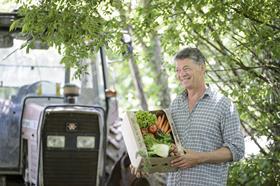
The founder of organic veg box company Riverford has hit back at a new study that claims organic food has a higher climate impact than its conventional counterpart.
Guy Singh-Watson said that while he wholeheartedly agrees that climate change is the most critical challenge facing the planet, organic farming’s many other environmental benefits must not be ignored.
The study, conducted by Chalmers University of Technology in Sweden and published in the science journalNature, arrives at its conclusion because organic farming currently requires more land to produce food.
The study states that greater land use leads to higher carbon emissions due to deforestation, and since the food trade is global, higher yields per hectare in Sweden could save land elsewhere in the world.
The study trialled a new carbon benefit measuring system to evaluate the climate impact of land use, but researchers noted that the carbon measure does not take into account biodiversity or other ecosystem values.
Singh-Watson said: “We cannot question that it currently takes more land to produce the same amount of food using organic practices on most commercial farms.
“To what extent this is compensated by sequestration of carbon in soils under organic management, reduced pollution, socio-economic benefits from typically smaller and more self-reliant farms, animal welfare, more nutrient dense food, health benefits for not eating pesticide-contaminated food and water, better quality water, more wildlife and generally increased biodiversity is hard to quantify in a single metric and depends on priorities.
“I would not question that climate change is the critical challenge facing our planet and, therefore, should come at the top of the list as a metric, but it seems almost unbelievably naive to assume that a hectare of land saved in Sweden by increasing yields would result in a hectare of forest saved in the tropics through the workings of a global market in food as seems to be a basis of this paper.”
The organic advocate also addressed the issue of lower yields in organic farming, suggesting that there is potential for organic yields to match, and in some cases, exceed, the yields seen in conventional farming.
“Commercial organic farming is in its relative infancy,” he said. “I would question whether yields necessarily need to be much lower under organic practices; indeed, I have seen instances where they are much higher. These are the exceptions, but they do provide evidence of what is possible.
“If anything like the investments in chemical agriculture made in organic techniques, yield gaps would close.”
Instead, Singh-Watson said what is needed is a multi-faceted approach to sustainability that includes a change in diets and a more ecological approach to farming, among other aspects.
“Our only hope of living sustainably on this planet depends on a substantial move towards plant-based diets among the wealthy, a reduction in food waste and an ecological approach to agriculture that fosters a healthy soil that sequesters carbon,” he said.
“This could involve technological inputs but will rely much more on ecological understanding to increase yields whilst preserving wildlife and diversity.”



